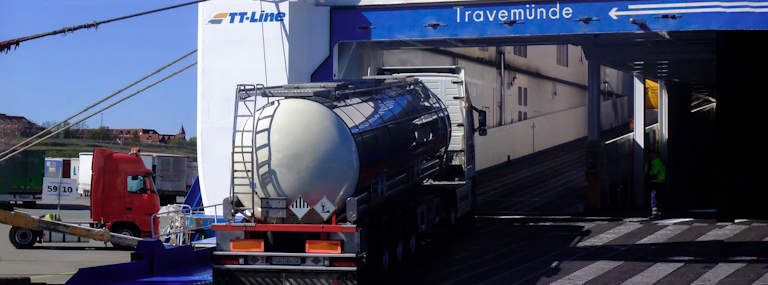The following conditions apply for the shipment of dangerous goods on TT-Line vessels:
- TT-Line transports dangerous goods in accordance with the IMDG Code in conjunction with the Memorandum of Understanding for the Transport of Packaged Dangerous Goods in the Baltic Sea - MoU
- TT-Line will not accept dangerous goods of:
- Class 7
- Class 1 (with the exception of Class 1.4S, only on request)
On „Passenger Departures“, acc. § 12 MoU TT-Line does not accept hazardous goods of:
- Class 2 „Toxic gases“ (ADR Cl.2/ Cl. Code T/IMDG Cl. 2.3), „Refrigerated Gases of ADR or of stowage category „D“ of the IMDG Code”
- Class 5.2 All types of cargo
- Class 6.2 All types of cargo
- Class 8 All cargo assigned to packaging group I
- TT-Line reserves the right to convert „Freight Departures“ into “Passenger Departures” at short notice. This can cause restrictions to the transportation of hazardous cargo.
- Dangerous Goods (even limited quantities as well as expected quantities) must always be booked in writing no later than 24 hours prior to departure.
- Bookings for dangerous goods are only considered final once all dangerous goods data has been checked by TT-Line and the booking has been confirmed as a „Dangerous Goods Booking“.
- Please note that the transport of hay, straw or bhusa can be dangerous goods. If such a transport is not marked as dangerous goods, TT-Line requires proof that it is not considered to be dangerous goods according to the IMDG code. The shipper is responsible for the classification.
- The Container/ Vehicle Packing Certificate is mandatory. Otherwise the unit can be refused and not be taken on the specific departure. This does not concern tankers and tankcontainers.
- Parking of vehicles carrying dangerous goods inside the port and terminal areas may be prohibited or significantly time restricted. To obtain accurate and up-to-date information, we recommend contacting the terminal administration directly or referring to the applicable Port Customs Regulations. If a TT-Line mafi trailer or chassis is used for sea carriage and remains at the terminal for more than 24 hours after vessel arrival, the transport unit will be discharged to the terminal area. Any resulting additional handling charges will be applied in accordance with the valid freight tariff conditions (extra lift).
![]() Tel. +49 (0) 4502 80182
Tel. +49 (0) 4502 80182